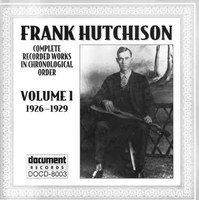 | Back to e-WV
| Back to e-WV
 The West Virginia Encyclopedia
The West Virginia Encyclopedia
 | Back to e-WV
| Back to e-WV
 The West Virginia Encyclopedia
The West Virginia Encyclopedia

During the booming 1920s, musicians from the southern West Virginia coalfields recorded some of the first solo guitar recordings ever made. They evolved a distinctive guitar style that reflected the diverse musical culture of the coalfields. Frank Hutchison, a white guitarist from Logan, blended white and African-American musical influences in the late 1920s. He recorded 35 songs and tunes for the OKeh Record Company between 1926 and 1929, and OKeh issued 28 of these. According to Sherman Lawson, a Logan County fiddler, Hutchison apparently learned much of his guitar style from a Black guitarist and singer named William Hunt. Unfortunately, record companies did not record Hunt or many other Black musicians in the West Virginia coalfields during the 1920s. From Hunt, Hutchison learned to play guitar with a closed pocket knife, by sliding it on the strings to produce a lonesome, crying sound. Hutchison played slide with his left hand while sometimes strumming and sometimes finger-picking with his right hand.
Dick Justice, also from Logan County, recorded blues, ragtime, British and American ballads, as well as old-time string-band tunes. Justice used both finger-picking and strumming, and he occasionally played with Frank Hutchison at informal get-togethers.
The duo Roy Harvey and Leonard Copeland, who lived around Beckley, recorded six guitar duets for Columbia Records in 1930. Their repertoire reflects the influences of parlor guitar, ragtime, blues, and popular music. Harvey and Copeland used both strumming and finger-picking. Roy Harvey was a railroad engineer. After losing his job for participating in a strike, he turned to music to make a living, recording numerous train songs. In addition to Copeland, Harvey recorded with such notable musicians as Charlie Poole and the North Carolina Ramblers. Jess Johnson, a native of Raleigh County, played slide guitar with Harvey on the recording of ‘‘The Guitar Rag.’’
Some guitarists have carried the coalfields guitar tradition into the 21st century. One was the late Carl Rutherford, from Warriormine in McDowell County, who learned guitar from his family, particularly his uncle, Will Muncy, who owned reissued records of Frank Hutchison. In 1942, Rutherford learned to play in the same tunings that Hutchison, Leonard Copeland, and Jess Johnson used. Muncy showed Rutherford how to play guitar with a closed Case knife, just as Hutchison had done.
Rutherford’s kinfolk who played banjo also influenced his finger-picking guitar style. He said the thumb-and-finger banjo picking of his mother and his Uncle Will gave him the idea of picking the guitar with his thumb and forefinger. In Rutherford’s guitar picking, the thumb played an alternating bass rhythm while the first finger played melody. Thus both recordings and oral tradition have spurred the creative development of mountain guitar styles.
One of the outstanding performers of blues in the African-American tradition was Nat Reese of Princeton. Reese, a guitarist and vocalist, earned the John Henry Award and the 1995 Vandalia Award.
Written by Jim McGee